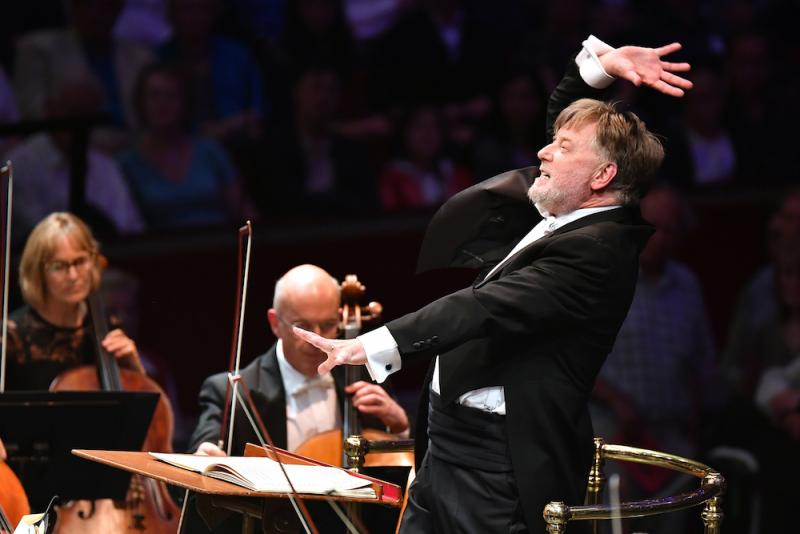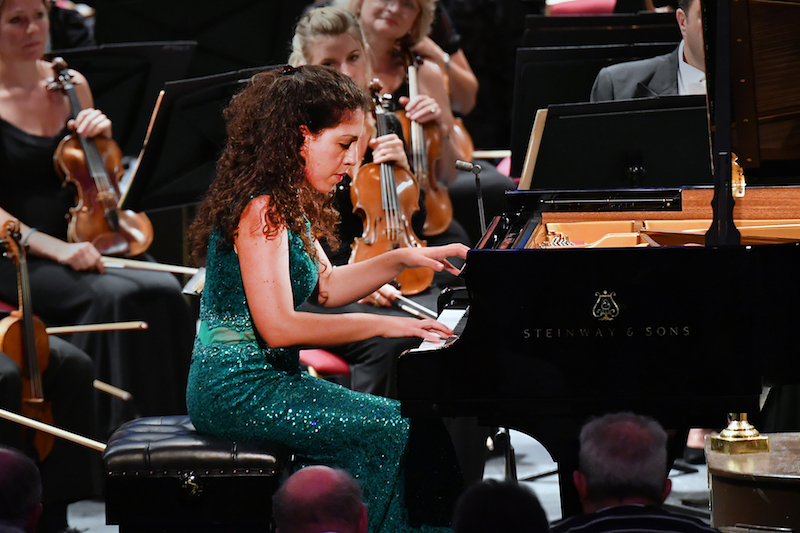Prom 13 review: Rana, BBCSO, Davis – Malcolm Sargent tribute lacks punch | reviews, news & interviews
Prom 13 review: Rana, BBCSO, Davis – Malcolm Sargent tribute lacks punch
Prom 13 review: Rana, BBCSO, Davis – Malcolm Sargent tribute lacks punch
Historical recreation of 500th Prom short of sparkle until Britten finale

Ten days ago I reviewed the First Night of the 2017 Proms. Last night I was back at the Royal Albert Hall to hear the First Night of the 1966 Proms. This time-capsule experience was courtesy of a re-enactment of Sir Malcolm Sargent’s 500th Prom, in what turned out to be his final season.
Andrew Davis was in energetic and animated form on the podium, belying his years with a physical engagement with the music. There was something of Sargent’s showmanship in Davis’s performance – particularly in the suite from Walton’s Façade – and in a speech he took care to flatter the Prommers, reminiscing about when he was a younster in the Arena watching Sargent conduct.
Beatrice Rana’s playing was by turns elegant, tender and muscular
There was a reminder of how times change right from the start, with Davis leading a standing BBC Symphony Orchestra and audience in a rendition of the national anthem, in 1966 the standard start to a Prom, nowadays something unusual without royalty present.
Berlioz’s Overture Le Carnaval romain was one of the first pieces of classical music I ever listened to, on a cassette tape my aunt gave me when I was eight. I don’t think I have ever heard it live, so this was my own personal nostalgic moment. Nostalgia aside, it is a terrific piece, buzzing with life and colour from its first moments to its last, played here with verve and attention to detail. Schumann’s Piano Concerto was well played by Beatrice Rana (pictured below). I admire the skilful integration of orchestra and piano that make it more than just a showpiece, although as a piece it does not set my pulse racing. Rana's playing was by turns elegant, tender and muscular, and the orchestra was well balanced alongside her.
The second half was all British 20th century repertoire, all genial, good-tempered music. There was nothing too heavyweight or challenging – Sargent was no esoteric – but some wonderful orchestral sounds to enjoy along the route. Elgar’s Cockaigne Overture is a piece of blatant populism, played with palpable enjoyment by the BBC Symphony Orchestra. It has the distinction of being the first piece broadcast by the BBC when it took over the Proms in 1927, and was later the first piece played at the first Prom at the Albert Hall in 1941. Malcolm Sargent himself conducted it 12 times in 20 years, and it still appeals to the Proms audience, who received it delightedly.
Elgar’s Cockaigne Overture is a piece of blatant populism, played with palpable enjoyment by the BBC Symphony Orchestra. It has the distinction of being the first piece broadcast by the BBC when it took over the Proms in 1927, and was later the first piece played at the first Prom at the Albert Hall in 1941. Malcolm Sargent himself conducted it 12 times in 20 years, and it still appeals to the Proms audience, who received it delightedly.
As they did the extracts from Walton’s Façade in the orchestral suite made by the composer from the original chamber work. But for me, although the orchestration adds a layer of sophistication and detail, it also flattens out the sharp edges of the original, and losing the narration greatly diminishes the piece.
The revelation of the night was Holst’s The Perfect Fool, music rescued – as with Berlioz’s earlier overture – from a failed opera project. I had not heard this before but really enjoyed it. All the best things about The Planets – rhythmic interest and drive, exotic coloration, blaring brass – could be heard here as well. It was often programmed by Sargent and, on this evidence, is due for a revival of interest.
After some forgettable Delius – apart from more beautiful playing from oboist Richard Simpson – we finished with an undeniable classic: Britten’s Young Person’s Guide. Premiered by Sargent in 1946 and a staple of his Last Nights, the music teems with ideas that flowed from Britten so readily that he wrote the whole 18-minute piece in two weeks. Davis set a good quick tempo throughout, relying on his players to keep up, and the crowning fugue is a compositional tour-de-force that cannot be bettered as a concert closer. Sargent – and Britten – surely knew how to finish on a high.
rating
Share this article
The future of Arts Journalism
You can stop theartsdesk.com closing!
We urgently need financing to survive. Our fundraising drive has thus far raised £49,000 but we need to reach £100,000 or we will be forced to close. Please contribute here: https://gofund.me/c3f6033d
And if you can forward this information to anyone who might assist, we’d be grateful.

Subscribe to theartsdesk.com
Thank you for continuing to read our work on theartsdesk.com. For unlimited access to every article in its entirety, including our archive of more than 15,000 pieces, we're asking for £5 per month or £40 per year. We feel it's a very good deal, and hope you do too.
To take a subscription now simply click here.
And if you're looking for that extra gift for a friend or family member, why not treat them to a theartsdesk.com gift subscription?
more Classical music
 First Person: Manchester Camerata's Head of Artistic Planning Clara Marshall Cawley on questioning the status quo
Five days of free events with all sorts of audiences around Manchester starts tomorrow
First Person: Manchester Camerata's Head of Artistic Planning Clara Marshall Cawley on questioning the status quo
Five days of free events with all sorts of audiences around Manchester starts tomorrow
 Goldscheider, Brother Tree Sound, Kings Place review - music of hope from a young composer
Unusual combination of horn, strings and electronics makes for some intriguing listening
Goldscheider, Brother Tree Sound, Kings Place review - music of hope from a young composer
Unusual combination of horn, strings and electronics makes for some intriguing listening
 theartsdesk Q&A: composer Donghoon Shin on his new concerto for pianist Seong-Jin Cho
Classical music makes its debut at London's K-Music Festival
theartsdesk Q&A: composer Donghoon Shin on his new concerto for pianist Seong-Jin Cho
Classical music makes its debut at London's K-Music Festival
 Helleur-Simcock, Hallé, Wong, Bridgewater Hall, Manchester review - moving lyricism in Elgar’s concerto
Season opener brings lyrical beauty, crisp confidence and a proper Romantic wallow
Helleur-Simcock, Hallé, Wong, Bridgewater Hall, Manchester review - moving lyricism in Elgar’s concerto
Season opener brings lyrical beauty, crisp confidence and a proper Romantic wallow
 Kohout, Spence, Braun, Manchester Camerata, Huth, RNCM, Manchester review - joy, insight, imagination and unanimity
Celebration of the past with stars of the future at the Royal Northern College
Kohout, Spence, Braun, Manchester Camerata, Huth, RNCM, Manchester review - joy, insight, imagination and unanimity
Celebration of the past with stars of the future at the Royal Northern College
 Jansen, LSO, Pappano, Barbican review - profound and bracing emotional workouts
Great soloist, conductor and orchestra take Britten and Shostakovich to the edge
Jansen, LSO, Pappano, Barbican review - profound and bracing emotional workouts
Great soloist, conductor and orchestra take Britten and Shostakovich to the edge
 Jakub Hrůša and Friends in Concert, Royal Opera review - fleshcreep in two uneven halves
Bartók kept short, and a sprawling Dvořák choral ballad done as well as it could be
Jakub Hrůša and Friends in Concert, Royal Opera review - fleshcreep in two uneven halves
Bartók kept short, and a sprawling Dvořák choral ballad done as well as it could be
 Hadelich, BBC Philharmonic, Storgårds, Bridgewater Hall, Manchester review - youth, fate and pain
Prokofiev in the hands of a fine violinist has surely never sounded better
Hadelich, BBC Philharmonic, Storgårds, Bridgewater Hall, Manchester review - youth, fate and pain
Prokofiev in the hands of a fine violinist has surely never sounded better
 Monteverdi Choir, ORR, Heras-Casado, St Martin-in-the-Fields review - flames of joy and sorrow
First-rate soloists, choir and orchestra unite in a blazing Mozart Requiem
Monteverdi Choir, ORR, Heras-Casado, St Martin-in-the-Fields review - flames of joy and sorrow
First-rate soloists, choir and orchestra unite in a blazing Mozart Requiem
 Cho, LSO, Pappano, Barbican review - finely-focused stormy weather
Chameleonic Seong-Jin Cho is a match for the fine-tuning of the LSO’s Chief Conductor
Cho, LSO, Pappano, Barbican review - finely-focused stormy weather
Chameleonic Seong-Jin Cho is a match for the fine-tuning of the LSO’s Chief Conductor
 Classical CDs: Shrouds, silhouettes and superstition
Cello concertos, choral collections and a stunning tribute to a contemporary giant
Classical CDs: Shrouds, silhouettes and superstition
Cello concertos, choral collections and a stunning tribute to a contemporary giant
 Appl, Levickis, Wigmore Hall review - fun to the fore in cabaret and show songs
A relaxed evening of light-hearted fare, with the accordion offering unusual colours
Appl, Levickis, Wigmore Hall review - fun to the fore in cabaret and show songs
A relaxed evening of light-hearted fare, with the accordion offering unusual colours

Add comment